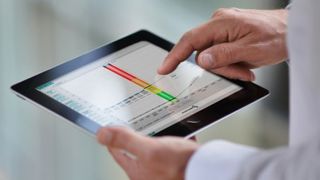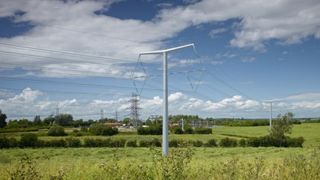The smart grid and how it will save the planet
Bringing digital mastery to critical infrastructure

We all know exactly how much data our smartphones use and our phone bills are itemised down to tenths of a second, but have you any idea how much electricity you and your home are consuming – or how much it's costing you? Aside from the annual check of the meter that triggers complex calculations and estimated bills, neither consumer nor utility company knows much at all about how electricity is being used.
Is it beyond the realms of possibility for each household to be able to monitor their real-time energy usage via a smartphone app? Or have off-peak tariffs and smart meters connected to household appliances so as to encourage the use of, say, washing machines and tumble dryers when energy is cheapest?
Both scenarios are almost upon us in the UK – in a predominately digital age where growing energy consumption needs ever more scrutiny, it's time for the smart grid.
"The term smart grid refers to a complex network of technologies, including renewable and micro-generation devices and related services, that will be deployed in distribution networks to achieve a more intelligent, efficient and flexible power distribution network," says Geoff Barker, Business Development Director, Flow Energy.

Why do we need a smart grid?
With energy consumption on the increase – and the eras of both electric heating and electric vehicles now upon us – some think that the smart grid is of pivotal importance. "The more accurate the technology we use to measure and distribute our energy, at every point across the grid, the more money can be returned to consumers and the fewer emissions can be generated by the country as a whole," says Jodi Huggett, Business Development Director for 4Eco immerSUN.
Global energy consumption is increasing by about 2% every year, according to the International Energy Agency (IEA), which together with predicted population increase means a doubling of demand every 35 years.
With data on the entire network, energy companies will have real-time visualisations of network conditions, solving outages and identifying failures more quickly. "This means they can address failing transformers or switches before the situation escalates into wider service disruptions," says Mike Ballard, Senior Director Utilities Strategy (EMEA) at Oracle.
Are you a pro? Subscribe to our newsletter
Sign up to the TechRadar Pro newsletter to get all the top news, opinion, features and guidance your business needs to succeed!

Why do we need smart meters?
Key to recording, understanding and reducing individual household's use and abuse of electricity is the smart meter, which is currently being rolled-out to UK homes. A smart meter is online and in frequent contact with the utility provider, which can use each homes' usage stats to create a big data-fuelled, interconnected and fully automated smart grid that directly ties energy production to real-time demand. The hope is that a smart grid will reduce peak and off-peak production.
"Data will be the driving force behind a successful smart meter roll-out," says Ballard. "Smart meters will allow retailers to build a highly detailed and up-to-date picture of individuals' energy usage, information they can then feed back to customers to help them make better-informed choices about their consumption."
As well as more accurate billing, smart meters will likely personalise the way electricity is bought and sold. "One likely outcome of the technology revolution is the end of kilowatt-per-hour pricing. Instead of paying per unit of energy, people will have the option to pay based on what temperature they want to maintain in their home," says Ballard.
It's estimated that smart meters will save UK households and the energy industry around £7 billion.
Jamie is a freelance tech, travel and space journalist based in the UK. He’s been writing regularly for Techradar since it was launched in 2008 and also writes regularly for Forbes, The Telegraph, the South China Morning Post, Sky & Telescope and the Sky At Night magazine as well as other Future titles T3, Digital Camera World, All About Space and Space.com. He also edits two of his own websites, TravGear.com and WhenIsTheNextEclipse.com that reflect his obsession with travel gear and solar eclipse travel. He is the author of A Stargazing Program For Beginners (Springer, 2015),

